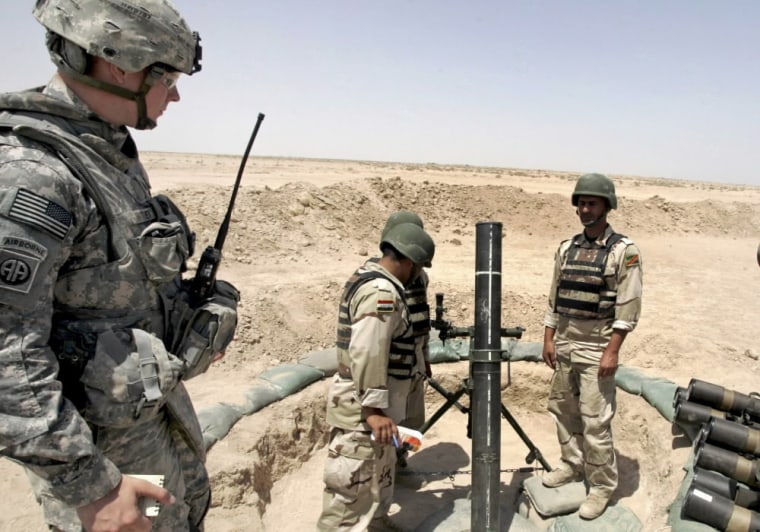Three years ago, the U.S. thinned out its presence in Baghdad and Iraqi forces could not stem the tide of sectarian fighting. By the end of June, Iraq's forces will again be in control of their cities — and many Iraqis wonder if they are up to the task.
Publicly, the U.S. military insists it has full confidence in Iraq's army and police to cope with security challenges after the June 30 deadline for American combat troops to leave Baghdad, Mosul and other cities.
Privately, however, some U.S. and Iraqi officials acknowledge no one can say with certainty whether Iraq's police and soldiers can perform until they assume the responsibility.
Many Iraqis fear that Sunni and Shiite extremists are laying low waiting for the Americans to pull back and won't wait long to mount a challenge.
"I think that there are terrorist groups that will try to carry out some terrorist and criminal activities in the coming period during and after the withdrawal of U.S. forces from the cities," Interior Minister Jawad al-Bolani said last week.
"Despite the existing security challenges and threats, I think that our security forces should be given the confidence and the chance to prove their capability," he added.
Iraqi forces proved incapable of meeting the challenge when the U.S. drew down its presence in the cities in 2005 and 2006, when U.S. policy called for handing responsibility to the Iraqis as quickly as possible.
Helping curb violence
As Shiite-Sunni fighting boiled over in Baghdad's streets, the White House reversed course and ordered the U.S. troop surge of 2007. That helped curb the violence, now at some of its lowest levels of the war.
But last month's spate of high-profile bombings in Baghdad alarmed many Iraqis.
Although major bombings have fallen about 50 percent since April, the attacks have left many Iraqis uneasy about what will happen when the Americans pull out of the cities — especially Baghdad and Mosul, where al-Qaida and other Sunni groups still operate.
"As a matter of principle, nobody wants foreign forces to stay in the country, but the current bloodshed acts proved that Iraqi forces are not ready yet to be responsible for security," said Haider Abbas, 45, a Shiite teacher in east Baghdad.
"Murders and explosions are taking place while there are U.S. troops inside the city," he added. "What will happen when they leave?"
The June 30 withdrawal date was provided for in the U.S.-Iraq security agreement that took effect this year. President Barack Obama plans to end U.S. combat operations by September 2010 and remove all U.S. troops from the country by Dec. 31, 2011.
Iraq's Shiite-led government insisted on a timetable for the withdrawal during last year's negotiations that produced the security agreement. But as the first deadline approaches, public anxiety is rising.
"I'm worried. Most of the Iraqi forces are unprofessional," said Dhargham Hussein, a 45-year Sunni from western Baghdad. "There are many sleeper cells and elements of (Shiite) militias as well as al-Qaida."
Guarding civilians
U.S. commanders have said some American troops will remain in Baghdad after June 30 as advisers. Some officials have suggested they could number about 2,500.
But the bulk of the U.S. force will relocate to major installations on the edge of Baghdad and be available to help if the Iraqis ask for them.
Stationing American combat troops in Iraqi neighborhoods to protect civilians was key to the strategy that brought an end to the sectarian slaughter that brought Baghdad to the brink of all-out civil war before the 2007 troop surge.
At the same time, the U.S. actively recruited Sunnis to turn against the insurgents and join self-defense paramilitary groups known as Awakening Councils or Sons of Iraq. They proved critical in helping curb insurgent violence in Sunni areas of Baghdad and elsewhere.
But the Shiite-led government was deeply distrustful of such armed paramilitary groups, whose ranks included many former insurgents. Recent arrests of Awakening leaders and problems with receiving salaries have left many of the 90,000 members demoralized.
The fear is that some of them may return to the insurgency or simply turn the other way if militants step up attacks.
'Too many unresolved issues'
Although U.S. officials insist Iraqi forces are better, they still face problems with supplies and logistics which limit their ability to operate on their own.
Iraqi soldiers and police prefer manning fixed checkpoints to patrolling the streets, which U.S. commanders believe is key to building public confidence.
More importantly, many Iraqis fear the security forces, most notably the police, are still under the influence of political groups and would not enforce the law evenhandedly.
It will take time to rebuild a sense of confidence that was lost in the sectarian fighting of two years ago.
"The U.S. withdrawal will worsen the situation," said Hamza Mehdi, 29, who owns an auto parts shop in Baqouba, 35 miles northeast of the capital. "I don't think that Iraqi forces are capable of maintaining security. There are too many unresolved issues."
More on Iraq
